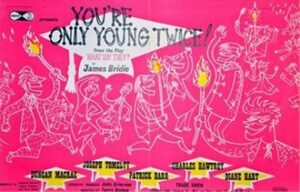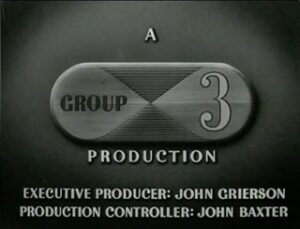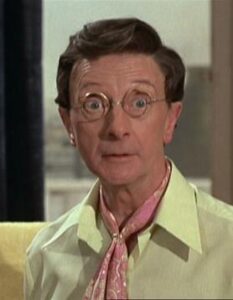You’re Only Young Twice ** (1952, Duncan Macrae, Charles Hawtrey, Joseph Tomelty, Patrick Barr, Diane Hart) – Classic Movie Review 13,388
The 1952 British second feature crazy comedy film You’re Only Young Twice is based on James Bridie’s 1939 play What Say They?, and stars Duncan Macrae, Charles Hawtrey, Joseph Tomelty, Patrick Barr, and Diane Hart.
Director Terry Bishop’s 1952 British second feature comedy film You’re Only Young Twice is based on James Bridie’s 1939 play What Say They?, and stars Duncan Macrae, Charles Hawtrey, Joseph Tomelty, Patrick Barr, and Diane Hart.
In a rare star part, Duncan Macrae excels as Professor Hayman, the puritanical head of a traditionally minded Scottish university brought down by his own folly when his pompous son Adolphus Hayman (Charles Hawtrey), President of Temperance Society, is inebriated at a college function.
Meanwhile, Ada Shore (Diane Hart), posing as Miss Lamplighter while searching out her dodgy Irish poet uncle (Joseph Tomelty), who is in hiding from the authorities, is mistakenly made new secretary to the college principal, Sir Archibald Asher (Patrick Barr), and they fall in love.
A bizarre Lucky Jim-style plot alas produces a mostly unfunny crazy comedy, with a creaky, cheap-looking production, and creaky old jokes too. A tasty crop of Fifties Scots actors all do their darndest for the project, though, along with many English ones too, with English actor Charles Hawtrey providing most of the film’s laughs as Adolphus Hayman. Co-writer Reginald Beckwith provides himself with a role as a BBC commentator. What little appeal this rather silly film has lies almost entirely in its pleasant cast and their game performances.
It is Ronnie Corbett’s film debut, aged 22, apart from an appearance aged seven in Will Hay’s film Good Morning, Boys (1937). He plays Freddie Mather, president of the Men’s Union.
The screenplay by Reginald Beckwith, Lindsay Galloway and Terry Bishop is based on James Bridie’s play What Say They?
The film was produced by the British government-backed Group 3 Films and shot at Southall Studios. Group 3 Films (1951 to 1955) was set up by the National Film Finance Corporation to finance films from newer film-makers. It was run by John Grierson and John Baxter, and made more than 20 films but lost £500,000.
John Grierson, head of Group 3 Films, said it has ‘some of the fastest and best dialogue in a generation’.
Release date: July 1952 (UK).
Covering their backs and all bases, the film starts with this:’ The Producers are grateful for the co-operation of the University of Glasgow. Nevertheless… All persons, places and incidents in this film are inventions. The traditions and customs of the four Scottish Universities differ widely in each… In this fifth University they differ more widely still.’
The cast
The cast are Duncan Macrae as Professor Hayman, Joseph Tomelty as Dan McEntee, Patrick Barr as Sir Archibald Asher, Charles Hawtrey as Adolphus Hayman, Diane Hart as Ada Shore, Robert Urquhart as Sheltie, Edward Lexy as Lord Carshennie, Roddy McMillan as Mr Milligan, Jacqueline Mackenzie as Nellie, Eric Woodburn as the Bedellus, Molly Urquhart as Lady Duffy, Ronnie Corbett as Freddie Mather, Reginald Beckwith as BBC Commentator, Scotty Beckett, Moultrie Kelsall, Russell Waters, Archie Duncan, Andrew Downie, Wendy Noel, and Alistair Hunter.
You’re Only Young Twice is directed by Terry Bishop, runs 81 minutes, is made by Group 3 Films, is released by Associated British-Pathé (UK), is written by Reginald Beckwith, Lindsay Galloway and Terry Bishop, is shot in black and white by Jo Jago, is produced by Terry Bishop, John Baxter, John Grierson and Barbara K Emary, is scored by Cedric Thorpe Davie, and designed by Ray Simm.
Charles Hawtrey (born George Frederick Joffre Hartree (30 November 1914 – 27 October 1988)
Charles Hawtrey appeared in more than 70 films including Alfred Hitchcock’s Sabotage (1936) and Will Hay’s Good Morning, Boys (1937) and Where’s That Fire? (1939).
Hawtrey’s last film was Carry On Abroad (1972), then dropped from the Carry On series by producer Peter Rogers, who said: ‘He became rather difficult and impossible to deal with because he was drinking a lot.’
© Derek Winnert 2025 – Classic Movie Review 13,388
Check out more reviews on http://derekwinnert.com




